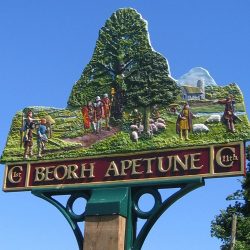THE CORNER OF HIS EYE
A day cold as sea shells, his breath smokes and the silence sings in his ears. It is the Winter Solstice, one of the hinges of the year. It is foggy and frosty and the day, young as yet, seems to hold its breath. Winter is bolting and barring the door to the coming of the Oak King. The lane is flanked by high banks and the winter weary tussocks of grass lie long and lank. The hedgerow at the top of the bank is a huddle of black shadows. Late autumn had buttered the field maple leaves and, alone of all the trees in the hedge, it held stubbornly on to them. Now and then a stir of air brings two or three floating down and he catches them, a handful of fairy gold and, like those deceitful coins, they will soon shrivel and turn to dust. Rain runnels lace the high banks and knuckled roots have elbowed through. The little Holly King, the robin, perches among them singing his wistful ritual song to the Solstice. The banks and lane are like a suburb of the wood, they know different changes of light, lives briefly lived, seasons which keep the balance of the year, changes of weather, they are a constant in continual change. The wood keeps its secrets to itself, fox, deer and mouse know, sparrow hawk and pigeon know but they too stay mum. Scrambling to the top of the bank he looks out over the field. Rain has filled ruts and hollows, furrows and folds and it reflects the light, calligraphic swirls over the skin of the land telling of more secrets. Out of the corner of his eye he catches a movement in a big sprawl of brambles and there is a wren, quick and quiet as a thought it moves. Then, there is another, a pair of cutty* wrens. They search the thorned stems moving deeper inside, living up to their name ‘Troglodytidae’, a cave dweller. In a few days time he thinks it will be St. Stephen’s Day and for generations it was traditionally the day when a wren was hunted and killed. Its body was fixed to the top of a pole and a great wreath of holly and ivy surrounded it. The Wren Boys went from door to door singing their song:
The wren, the wren, the king of all birds,
St. Stephen’s Day was caught in a furse,
Although he is little, his family’s great
I pray you good lady, give us a treat.
The story tells that Stephen had been preaching and he was running for his life from those who would kill him because of this and he hid. A wren near where he was hiding from his pursuers began to sing very loudly and attracted their attention, Stephen was discovered and stoned to death. Hence the hunting of the Cutty Wren. In the song he is referred to as the king of the birds, another story in which the birds held a competition to see who could fly the highest and be given the title of King. Up they all flew and away the eagle soared, high as a giant can hurl and just as the birds were going to call him the winner, above him who should be flying but the wren! He had held onto the eagle’s back, not just cutty but canny as well! Hunting the Cutty Wren died out in the early 1900’s, other days, other ways. However at Middleton in Suffolk a similar tradition was born and the wren this time is a carved from wood and is honoured and celebrated by song, dance and story by a side of Molly Dancers, ‘The Old Glory’.
‘Cutty’ means small or short. You will doubtless have heard of the ‘Cutty Sark’, she is the last of the tea clippers and is preserved in dry dock in London. The name comes from a poem by Robert Burns which tells of a witch, Nannie, who wore a ‘cutty sark’, a short shirt. The clipper’s figurehead is the witch.
Pat Mlejnecky
